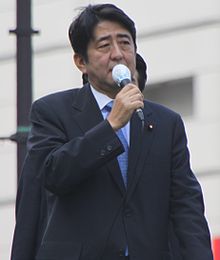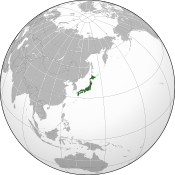Japan government panel urges reinterpretation of pacifist constitution
Saturday, February 8, 2014

Image: 多摩に暇人.
A Japan government panel met last Tuesday and is drafting a report aimed to urge Japan to loosen restrictions on participation in military combat — restriction of military to self-defense — imposed in its constitution since the end of World War II. They expected to finalize the report after April. North Korea reacted by calling the Prime Minister of Japan, Shinzo Abe, an "Asian Hitler" on Wednesday.
The government panel — fourteen members headed by Shunji Yanai, former ambassador to the US — sought ways to reinterpret the constitution on the grounds there was not enough public support for revising, or rewriting, the constitution itself.
Shinzo Abe said he was motivated to help keep international peace — by protecting other nations' troops, which was beyond the scope currently allowed under the constitution. He interpreted it as a country's right, commenting, "it's about whether we can exercise this right that every country has".
During the Tuesday meeting, Abe also expressed a concern that the country's national security was not ready for potential regional conflicts: "Japan's preparation for national security threats in the region is not sufficient. We must cover all the bases to protect the people's lives and safety in any possible scenario". Yousuke Isozaki, a security policy adviser to Mr Abe, said a revised military policy would strengthen Japan's ties with allies, the US in particular.
The Korean Central News Agency, the official news agency of the North Korean government, commented in an editorial, saying Abe was trying to conjure up fears of North Korea using missiles or nuclear weapons to help justify expanding Japan's military. The Korean Central News Agency were likening Abe to Hitler. The editorial followed a comment by Rodong Sinmun, the ruling party — Workers' Party of Korea — newspaper, which described Abe as a "militarist maniac" last month. The reaction was also inspired by Abe's visit to Yasukuni Shrine in December.
Under Japan's pacifist constitution, the country has not been able to engage in militaristic combat since the end of World War II.
CHAPTER II. RENUNCIATION OF WAR
- Article 9
- Aspiring sincerely to an international peace based on justice and order, the Japanese people forever renounce war as a sovereign right of the nation and the threat or use of force as means of settling international disputes.
- In order to accomplish the aim of the preceding paragraph, land, sea, and air forces, as well as other war potential, will never be maintained. The right of belligerency of the state will not be recognized.
– Constitution of Japan
Commenters related the move to escalated tensions with China, who had set up an Air Defense Identification Zone over a part of the East China Sea, including Japan's Senkaku Islands, in November last year.
Sister links
Sources
- Isabel Reynolds. "Japan's Shinzo Abe eyes biggest military rule change since WWII" — The Sydney Morning Herald, February 7, 2014
- "North Korean media attacks Japanese PM Shinzo Abe" — United Press International, February 5, 2014
- AFP. "North Korea calls Shinzo Abe 'Asian Hitler'" — Business Insider, February 5, 2014
- Julian Ryall. "Japan's defence ban must be revised, says government panel" — South China Morning Post, February 5, 2014
- Mari Yamaguchi (AP). "Panel: Japan Should Lift Ban on Collective Defense" — ABC News, February 4, 2014
- Mari Yamaguchi (AP). "Government panel to say Japan should lift ban on collective self-defense" — The Japan Times, February 4, 2014



